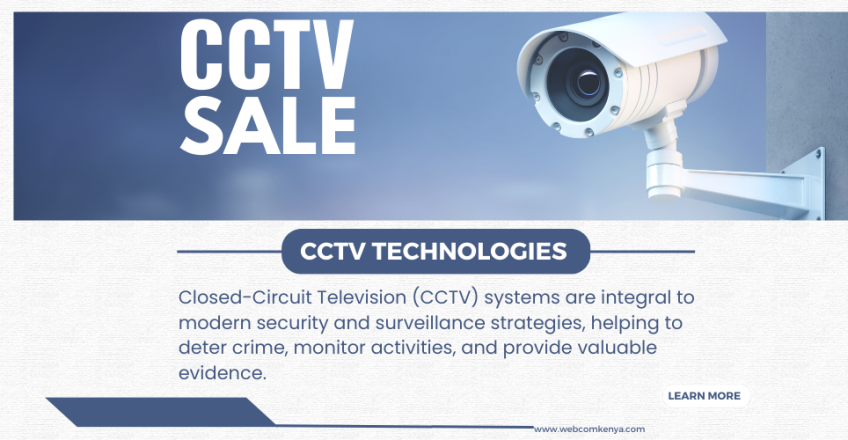
Closed-Circuit Television (CCTV systems)
(CCTV) refers to a system of video cameras, monitors, and recording devices used to monitor and record activities within a specific area or property. Unlike broadcast television, where signals are transmitted openly, CCTV operates on a closed circuit, meaning the video feed is only accessible to authorized individuals.
CCTV systems serve various purposes, ranging from security and surveillance to monitoring and data collection. These systems are widely utilized in both residential and commercial settings, including homes, businesses, public spaces, and institutions.
The primary components of a CCTV system include cameras that capture video footage, monitors to display the live or recorded feed, and recording devices like DVRs (Digital Video Recorders) or NVRs (Network Video Recorders) to store the footage for later review. Some modern systems even offer remote access capabilities, allowing users to monitor their property in real-time using smartphones, tablets, or computers.
The benefits of CCTV include deterring criminal activity, providing evidence in case of incidents, enhancing safety for occupants and assets, monitoring high-risk areas, and optimizing processes through video analysis. However, the use of CCTV also raises concerns about privacy, as the technology can potentially infringe on individuals’ rights if not implemented responsibly and ethically.
In conclusion, CCTV systems play a crucial role in enhancing security, safety, and surveillance across various contexts, contributing to the protection of people, property, and assets while also raising important considerations about privacy and ethical use.
 BENEFITS OF HAVING CCTV
BENEFITS OF HAVING CCTV
Installing a Closed-Circuit Television (CCTV) system can offer numerous benefits for both residential and commercial settings. Some of the key advantages include:
- Crime Deterrence: Visible CCTV cameras can discourage criminal activity, preventing theft, vandalism, and unauthorized access.
- Evidence Collection: CCTV footage provides valuable evidence in case of incidents, aiding investigations and legal proceedings.
- 24/7 Surveillance: CCTV systems offer round-the-clock monitoring, enhancing security even during off-hours.
- Remote Monitoring: Modern systems allow remote access, enabling real-time monitoring via smartphones and computers.
- Employee and Customer Safety: CCTV contributes to a safer environment for employees and customers, reducing potential risks.
- Reduced Theft and Losses: Deterrence and surveillance result in decreased theft, reducing losses for businesses.
- Insurance Premiums: Some insurance providers offer reduced premiums for properties with CCTV, due to enhanced security.
- Employee Accountability: Monitoring employees can improve productivity and adherence to company policies.
- Site Management: For large properties or multiple locations, CCTV aids in overseeing operations effectively.
- Health and Safety Compliance: CCTV helps ensure compliance with health and safety regulations in various industries.
- Remote Access Control: Some advanced systems allow remote access control, enabling secure entry remotely.
- Monitoring High-Risk Areas: CCTV is effective for monitoring areas prone to accidents, helping to prevent them.
- Visitor Management: For buildings, CCTV assists in tracking and managing visitor movements.
- Documentation and Analysis: CCTV footage can be reviewed for process optimization, customer behavior analysis, and more.
- Peace of Mind: Knowing that your property is under surveillance provides peace of mind to owners and occupants.
Remember that while CCTV offers many benefits, ethical considerations and privacy laws should be adhered to, especially when monitoring public spaces and the use of footage involving individuals.
 Best Practices for Effective CCTV Maintenance
Best Practices for Effective CCTV Maintenance
To ensure the reliability and functionality of your CCTV system, regular maintenance is essential. This article explores key maintenance practices that will keep your CCTV system in optimal working condition.
1. Regular Inspections
Perform routine visual inspections of your CCTV cameras, cables, connectors, and recording equipment. Look for signs of wear and tear, corrosion, or damage that might compromise the system’s performance.
2. Clean Cameras and Lenses
Dust, dirt, and environmental factors can accumulate on camera lenses, affecting image quality. Clean lenses with a soft, lint-free cloth and a lens cleaning solution to maintain clear visuals.
3. Check Camera Angles
Over time, vibrations or movements might cause camera angles to shift. Regularly ensure that cameras are still capturing the intended areas without obstruction.
4. Monitor Power Supply
Check power supplies and connections to ensure a stable power source. Unstable power can lead to system failures and potential loss of crucial footage.
5. Review Recording Quality
Regularly review recorded footage to ensure that it meets your desired quality standards. Adjust settings if necessary to maintain clear and usable images.
6. Update Firmware
Manufacturers often release firmware updates to enhance system performance and security. Regularly update the firmware for cameras, recorders, and other components.
7. Test Alarm Systems
If your CCTV system is integrated with alarms or motion detection, regularly test these features to ensure they function as expected. Address any false alarms promptly.
8. Backup and Storage Management
Check the status of your recording equipment’s storage capacity. Regularly back up important footage and manage storage to prevent overwriting crucial data.
9. Clean and Secure Cabling
Keep cables organized and protected from environmental factors. Clean and secure cabling to prevent damage and signal interference.
10. Address Environmental Factors
Consider the environmental conditions in which your CCTV system operates. For outdoor cameras, ensure they are weatherproof and resistant to harsh elements.
11. Professional Maintenance
Schedule periodic professional maintenance checks by experts who can identify potential issues and perform thorough inspections.
Conclusion
A well-maintained CCTV system is a reliable tool for enhancing security and monitoring activities. By following these best practices, you can ensure that your CCTV system remains in optimal working condition, providing peace of mind and accurate surveillance when you need it most. Regular maintenance not only extends the lifespan of your equipment but also ensures that your investment in security remains effective and valuable over time. To explore more on Billing System FAQ Guide, click on this link: Billing systems
to view all our services click on the link: Webcom Kenya
For more updates and insights, follow us on Twitter @webcomcloud.
 BENEFITS OF HAVING CCTV
BENEFITS OF HAVING CCTV Best Practices for Effective CCTV Maintenance
Best Practices for Effective CCTV Maintenance
